By Judith Maas, Library Assistant
Each month the Reader Services department at the MHS offers a new display of thematically related books in the library’s reference room. Prior to our closure due to the COVID-19 pandemic, I had been exploring our collection of materials on the James family for a book display and found a wide assortment of items, both by and about family members. To keep the library’s tradition going, I decided to bring my planned display online, along with brief descriptions of each book. I hope these selections inspire some enjoyable late summer and early autumn reading!
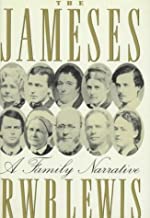
Farrar, Straus, and Giroux, 1991
In a New York Times interview (Aug. 7, 1991), Yale scholar Lewis states that he had first intended to create a television series portraying the lives of several generations of a great American family. That idea evolved into this epic family biography, ten years in the making. The story begins in 1789, when William James, the son of a farmer, emigrates from Ireland to Albany, New York, and builds a fortune in real estate, trade, and banking. At the heart of the book is the story of William’s son, Henry, Sr., Henry’s wife Mary Walsh, and their five children (among them Henry, William, and Alice). Lewis not only traces the lives of individual family members but explores how family relationships influenced their literary, psychological, and philosophical outlooks.
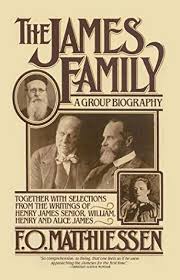
Knopf, 1947, 1961
Viewing the story of the James family as “internal rather than external, a biography of minds in action” (v), Harvard scholar Matthiessen incorporates many primary documents into his study—letters, essays, journal entries, and criticism; the work thus serves as both anthology and biography. A review in the journal Modern Language Notes by Quentin Anderson (Feb. 1949) highlights those selections that show how William and Henry viewed each other’s work as well as criticism by family members of the writings of Emerson, Carlyle, and Hawthorne. According to Anderson, “Although the work as a whole does not much enrich our sense of what went on in the family circle, it does give us excellent opportunities to see the members of that circle facing outward and appraising the world about them” (117).
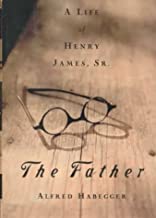
Farrar, Straus, and Giroux, 1994
The elder William James’s fortune granted his son, Henry James, Sr. (1811-1882), the freedom to engage in diverse philosophical and spiritual pursuits, among these the thought of the Swedish theologian Emanuel Swedenborg and that of the French utopian socialist Charles Fourier. In lieu of an ordinary occupation, Henry, Sr., became a self-styled “seeker for truth” (306), writing essays, befriending writers and intellectuals, and tending to the education of his children. He encouraged lively debate at the family dinner table, and the children experienced cosmopolitan, if erratic, schooling, as he shepherded the family back and forth between America and Europe. Habegger, formerly an English professor at the University of Kansas, explores the role of youthful hardships in shaping Henry, Sr.’s, character and ideas; his studies and writings and their intellectual context; and his highly original approach to raising children.
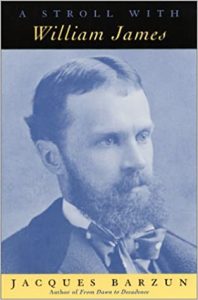
Harper & Row, 1983
Barzun’s study of William James (1842-1910) is multifaceted–part biographical portrait; exploration of James’s thought and writings; cultural history; and loving tribute, with Barzun viewing James as a friend, inspiration, and teacher: “his ideas, his words, his temperament speak to me with intimacy as well as force….He is for me the most inclusive mind I can listen to….” (4). The eclectic approach seems apt for James, a thinker who distrusted strict classifications and systems.
Barzun, a historian and essayist, recounts James’s slow, difficult journey from aspiring artist, to medical student, to psychologist and philosopher. He examines his essays and major works, considering the Principles of Psychology to be James’s masterpiece and describing his great subject in that work as “thoughts and feelings as experienced” (36); here is where James coined the phrase “stream of consciousness.” Discussing the sometimes misunderstood concept of “pragmatism,” Barzun distinguishes between mere expediency and what James meant by the term: “an attempt to explain how the mind ascertains truth” (83). Seeing James as an “assessor” (184) of his era, Barzun devotes a chapter to the emergence of modernism out of the upheavals taking place during the 1890s and early 1900s.
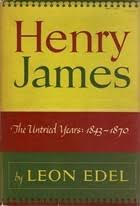
Lippincott, 1953
Edel’s scholarship on Henry James (1843-1916) was an act of devotion and a lifetime pursuit. In addition to writing a five-volume biography, Edel edited anthologies of James’s letters, plays, essays, criticism, and stories. The biography, published between 1953 and 1972, has been noted for its scholarly thoroughness, narrative skill, and use of psychoanalytic interpretation.
Volume 1, The Untried Years, takes James from childhood through to his late 20s, when he returns to America from his Grand Tour of Europe. Among the subjects Edel treats are James’s family relationships, his feelings of rivalry with older brother William, his schooling, his early writing efforts, and his relationship with his cousin Minnie Temple, often seen by critics as the prototype for the character Milly Theale in the novel The Wings of the Dove. Writing in the Sewanee Review (Jan.-Mar. 1955), critic Joseph Frank says of volume 1, “…it is good to be reminded of the sheer inexhaustible delight in the complex variety of the human scene that a leisurely and ample biography often provides” (168). For Edel’s views on what he called the “noble and adventurous art” (WL, 19) of biography, see his Writing Lives: Principia Biographica (Norton, 1984, 1959).
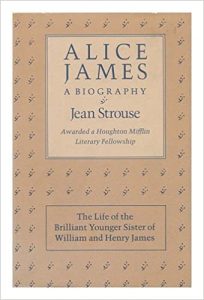
Houghton Mifflin, 1980
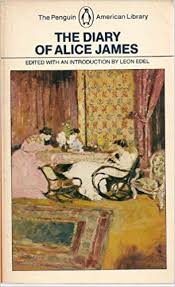
Dodd, Mead, 1964
Alice (1848-1892) was the youngest of the James children and the only daughter. At age 19, she suffered the first of many mysterious illnesses. While her brothers William and Henry grew up to achieve glory in the fields of literature and philosophy, Alice settled into invalidism, her day-to-day life private and circumscribed. Yet however confined her world, she desired self-expression and an outlet for her talents and intellect. As Strouse writes in her introduction, when she was able, James held salons in Boston and London and conducted correspondence courses in history for women across the country. She was a devoted letter writer and an observant diarist. In this biography, Strouse places James’s life in its familial and cultural context while treating her particular hopes and struggles as worthy of study and understanding in their own right; though Alice James’s story does not fit our usual notions of success and accomplishment, her “attempt to find something whole and authentic in her own experience,” Strouse contends, “gives her life its real stature and interest” (xvi, 1982 pbk. ed.).
James’s diary, Strouse notes, contains “a wide range of original reflections on society, politics, literature, history, and the people she knew” (xii). It was first published in 1934, and re-issued in this more complete edition, edited by Leon Edel, in 1964. From the outset, the diary was well-received, as suggested by a review in The New Republic (quoted in Strouse’s biography): “In some of her insights, some of her assessments of nineteenth-century humbug, Alice James went beyond either of her eminent brothers, and her judgements on the social history of her day have now the air of something like divinations” (358).

